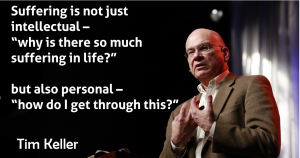I can’t possibly forgive them …
Traumatic wounds are especially severe when they involve a ‘violation of the human connection’. Indeed, there is no greater trauma than to be wounded by the very people we count on to support and protect us – (Judith Herman, Harvard Medical School). These are the ones that are the hardest to forgive.
Three myths about hurt and suffering, adapted from (MacDonald, 2004):
- A Broken World is an exception, not the rule
- It actually happens to everyone (just differently for each person)
- Antidote – Know History
- A Broken World experience can never happen to me
- Antidote – Know yourself
- If and when my world does break, I can more than handle the results
- Antidote – know God’s limits for your protection, and know God’s love for strength
When a Broken World happens will you:
- Concentrate on the pain of this experience and RESIST it? (fight back, not forgive)
- Permit the pain to become an environment in which God can clearly speak to you about matters he deems as ultimate importance?
Forgiveness comes from suffering, and there are several types of suffering: (Tim Keller)
| Wrong behaviour – and consequences | Guilt and shame | |
| Betrayal and attacks by others | Anger and resentment | |
| Universal loss: Illness, financial reversal, death of a loved one, or your own terminal illness | Grief and fear | |
| Mass carnage: earthquake, bomb, shooting etc | Confusion and anger to God | |
| Or a combination |

Suffering can help us to examine ourselves and see OUR weaknesses, because it brings out the worst in us. It’s not JUST about the other person. What might your suffering (from others) tell you about you? Are you:
Weaknesses in Suffering
- Weak in faith
- Sharp Tongued
- Lazy
- Insensitive to people
- Worrier
- Bitter in spirit
- Show weaknesses of character evident to others
- Too abrasive
- Critical
- Ungenerous
- Impulsive and impatient
- Argumentative
- Stubborn
- A poor listener
- Someone who needs to control
- Too fragile / self-pitying
- Unreliable
- Timid
- Dishonest
For example, when you are betrayed, it is because someone perceives that they have been wronged by you, and they may embark on a programme of trying to hurt you or damage your reputation. This trial can tempt you to give in to debilitating anger and bitterness – but the art of forgiveness may help stem that.
So, through suffering:
- Do you want to know who you are, your strengths and weaknesses?
- Do you want to be a compassionate person who skilfully helps people who are hurting?
- Do you want to have such a profound trust in God that you are fortified against the disappointments of life?
- Do you simply want to be wise on how life goes?